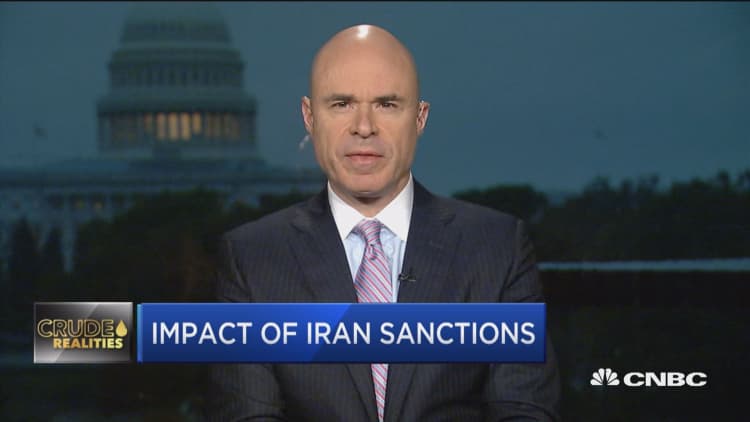Oil prices were little changed on Monday after a steep five-day slump, as the United States formally imposed punitive sanctions on Iran but granted eight countries temporary waivers allowing them to keep buying oil from the Islamic Republic.
The sanctions are part of U.S. President Donald Trump's effort to curb Iran's missile and nuclear programs and diminish its influence in the Middle East.
Oil markets have been anticipating the sanctions for months. Prices have been under pressure as major producers including Saudi Arabia and Russia have ramped up output to near-record levels, while weak economic figures in China have cast doubt on the demand outlook.
News of waivers on the sanctions limited price gains, and recent weakness in equities markets have fed concerns about global oil demand, said Bob Yawger, director of futures at Mizuho in New York.

"We're not getting the price rally that many participants thought they were going to get out of the Iran sanctions situation," Yawger said.
Brent crude oil was up 34 cents, or half a percent, at $73.17 a barrel by 2:30 p.m ET. U.S. light crude ended Monday's session 4 cents lower at $63.10 a barrel.
Both oil benchmarks have slid more than $13 a barrel since hitting four-year highs in early October. Hedge funds have cut bullish bets on crude to a one-year low.
The United States has granted exemptions to eight countries — China, India, Greece, Italy, Taiwan, Japan, Turkey and South Korea — allowing them to temporarily continue buying Iranian oil, Secretary of State Mike Pompeo said on Monday. Some of these are OPEC member Iran's top customers.
U.S. officials have said the aim of the sanctions is eventually to stop all Iran's oil exports.
Pompeo said more than 20 countries have already cut oil imports from Iran, reducing purchases by more than 1 million barrels per day.

Iran said on Monday it would break with the sanctions and continue to sell oil abroad.
China's foreign ministry expressed regret at the U.S. move.
Combined output from Russia, the United States and Saudi Arabia rose above 33 million bpd for the first time in October, up 10 million bpd since 2010, with all three pumping at or near record volumes.
The Abu Dhabi National Oil Company plans to boost oil production capacity to 4 million bpd by the end of 2020 and to 5 million bpd by 2030, it said on Sunday, from output of just over 3 million bpd.
Data from analysis firm Kayrros showed Iranian crude production was broadly unchanged in October from September, with barrels still hitting the market alongside additional production from Saudi Arabia and Russia.
— CNBC's Tom DiChristopher contributed to this report.

